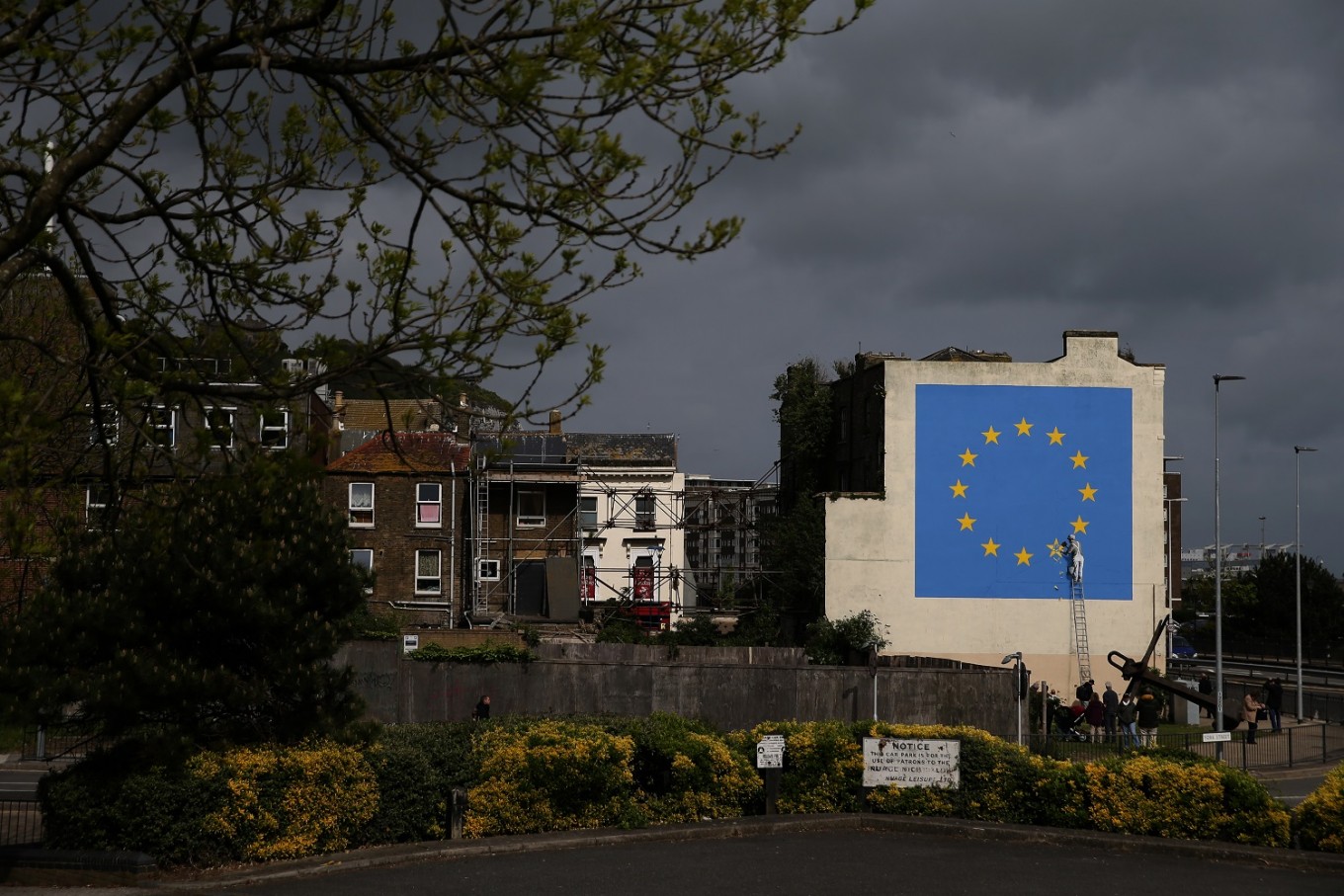Popular Reads
Top Results
Can't find what you're looking for?
View all search resultsPopular Reads
Top Results
Can't find what you're looking for?
View all search resultsSupreme Court to decide on UK-Scotland Brexit standoff
When UK Prime Minister Theresa May unveiled her key piece of Brexit legislation, Scottish leader Nicola Sturgeon called it a "naked power grab." She said hard-fought local powers would be transferred straight back to London when the UK left the European Union.
Change text size
Gift Premium Articles
to Anyone
 A recently painted mural by British graffiti artist Banksy, depicting a workman chipping away at one of the stars on a European Union (EU) themed flag, in Dover, south east England on May 8, 2017. British street artist Banksy has created his first mural inspired by Brexit, showing a workman chipping away at one of the stars on the European Union flag. The work appeared on the side of a house on Sunday in Dover, a port town just across the Channel from France that is Britain's closest point to mainland Europe. (AFP/Daniel Leal-Olivas)
A recently painted mural by British graffiti artist Banksy, depicting a workman chipping away at one of the stars on a European Union (EU) themed flag, in Dover, south east England on May 8, 2017. British street artist Banksy has created his first mural inspired by Brexit, showing a workman chipping away at one of the stars on the European Union flag. The work appeared on the side of a house on Sunday in Dover, a port town just across the Channel from France that is Britain's closest point to mainland Europe. (AFP/Daniel Leal-Olivas)
Brexit is back before the UK’s top judges.
When UK Prime Minister Theresa May unveiled her key piece of Brexit legislation, Scottish leader Nicola Sturgeon called it a "naked power grab." She said hard-fought local powers would be transferred straight back to London when the UK left the European Union.
The standoff now moves to the Supreme Court -- located opposite the Palace of Westminster -- where seven judges will on July 24-25 consider whether First Minister Sturgeon’s rival attempt to control the withdrawal process is constitutional.
A ruling against a Scottish bill, which seeks to preserve devolved powers when EU law is converted into British law, would allow May to impose British sovereignty over the will of the Scottish Parliament. Scotland voted to remain in the EU in the referendum.
Overruling Holyrood, as the Edinburgh-based assembly is known, would be politically sensitive -- particularly over such a historic move as Brexit -- and would set a precedent in a constitutional setup that’s only 20 years old. It also risks playing into the hands of the nationalists who are trying to build a case for another independence referendum.
Center Stage
The hearing comes 18 months after the Supreme Court took center stage in an earlier Brexit battle where judges ruled May’s government must give lawmakers a vote before formally triggering the UK’s departure.
The ruling, broadcast live across the country, was played out amid a media frenzy. It came after lower court judges were labeled in one newspaper as “Enemies of the People” for backing a lawsuit giving Parliament more of a say over the Brexit process.
This time around the coverage is likely to be less heated.
May’s government is challenging "a preemptive move by the Scottish Parliament to control the process and set the framework by which EU retained law gets adopted into British law," said Akash Paun, senior fellow at the Institute for Government in London. The UK needs to resolve the uncertainty with the Scottish bill “otherwise it might introduce delays into the Brexit process.”
At Fault
UK ministers who refused to engage with the Scottish Parliament must be at fault for "any uncertainty, confusion or ambiguity" stemming from two potentially conflicting bills, James Wolffe, the legal adviser to the Scottish government said, according to court documents.
The legislation "gives the Scottish ministers the powers needed to ensure that devolved law that is saved or incorporated into domestic law continues to operate effectively after the UK has left the EU," Wolffe said. The Scottish government said it wouldn’t comment further.
Unlike the other devolved regions, the UK government hasn’t yet published its arguments on the bill. The referral to the Supreme Court is "to seek legal certainty as to its competence," the government said in a statement.
Scotland is responsible for its own education, health and transport policies as well as the judicial system and some financial affairs. The UK ceded more autonomy as part of promises made during 2014’s independence referendum campaign.









